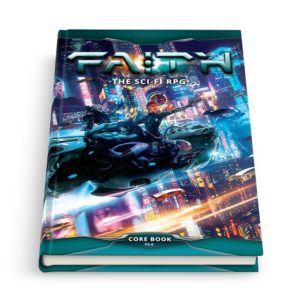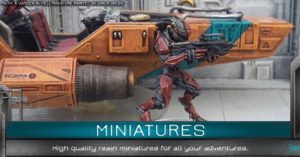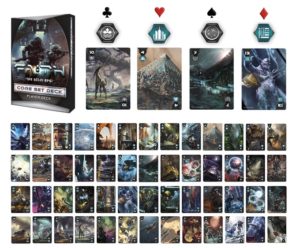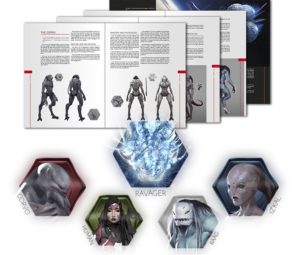We got to talk to the Burning Games Crew about their Kickstarter for their Silver ENnie winner/Golden Geek Nominated Faith: The Sci Fi RPG with revised rules and miniatures!
This is a revised version of the original Faith RPG. What’s different about this version?
As far as rules go, we have taken this opportunity to revisit some of the rules for additional clarity, to simplify some of the more convoluted core mechanics to streamline the gameplay and to add more options to character creation and development. We have also added rules for spaceships that include travel, combat and spaceship creation and customization. The biggest difference is, by far, the expanded setting. What used to be a lose setting painted in broad strokes is now a rich universe, full of adventures, stories, places to visit and iconic characters to meet. We have done our best to create a universe that will capture the imagination of players and GMs alike, a world full of opportunities, mysteries and conflicts. On top of that, the entire book is full of breathtaking new illustrations depicting the different locations and NPCs that players will be able to visit.
These days it seems everyone is obsessed with miniatures. Why did you decide to go that route this time around?
Miniatures are a cool way to bring a universe to life, and it’s something that we have wanted to do since we first started with Faith. We like to do things our way, though, and we are always looking for ways to bring something new to the table. 0G minis are our little addition to the miniature market, in the shape of Yi Lee, a female corvo that appears floating on the air. Faith uses card to plan out abilities. Most RPG’S use dice. Why go the card route? When we designed the Faith mechanic we thought about the contribution we could make to the RPG community. There are many beautiful dice-based systems out there, and we decided to make something different, something that would bring more control over the destiny of the character to each player. At the end of the day both dice and cards are a tool with which to resolve action and storytelling beats, a mechanical excuse to allow people to have fun. Our is a new option in this exciting hobby.
The NPC and Gear Decks look amazing! Why add those to the game?
The NPC and Gear decks have been at the core of the Faith concept since its inception. Another key original idea was the concept of “bringing the art to the table”. When we GM ourselves, we do not massively enjoy having to flick through a big book any time we want to know the stats of a particular NPC. Having everything on the table saves time and allows players to immerse themselves more deeply in the game.
Why base the game on faith? Do you feel that the subject of religion might turn people away?
The name comes from the five Gods that shape reality through their believers; it’s a roleplaying mechanic that we really like and it’s at the core of the game. Apart from that, the setting does not center on religion at all, but on many things from politics between species, to the struggles of ordinary people. We certainly hope it does not turn people away! Who are these true Gods in Faith and why did you settle on them? The Gods of Faith are a bit different from how we understand them in real life. In this case, the morality of each person will “link” him or her to a particular God. For example, an altruist person will be linked to Ergon, and a selfish one to Kaliva. The closer they follow their commandments, the more power they’ll be granted. There are five Gods in total, and represent different points in the communitarian-individualistic and selfish-altruistic continuums.
You also wanted to not have truly “bad guys” in the history of Faith, just differences of opinion. Why did you decide on that?
The main species are indeed neither good nor bad. The Corvo are highly individualistic and expansive, but they also value freedom and success. The Iz’kal, on the other hand, are communitarian and egalitarian, but also authoritarian and hermetic. Even the Ravager, a species that destroys worlds to obtain DNA, have powerful leaders with personal goals, the embodiment of evolution. We believe talking about good and evil is an overly simplistic way of approaching most themes. Instead of inviting players to explore or try to understand different points of view, you are imposing on them the idea that certain ideals are inherently bad, regardless of the reasoning behind them. None of the species in this game are evil creatures that wish harm on others for no reason – at least not as a whole -, and each has its own motivations and morality.
Why do you think politics is a basic staple in space themes and in your game in particular?
When two different groups of people or species meet in this universe, the relationship boils down to what we name “politics”. These politics can lead to war and slavery (a classic example is the discovery of America in the mid 16th Century) or a more or less stable balance. Although for example, the Dark Forest Theory states that the former is the only possible outcome, we opted for the latter. Two large species (the Corvo and the Iz’kal) were brought together by happenstance and this is what happened next. But that’s the setting, the background of the game. The actual adventures take place in the world created by the consequences of politics.
It looks like you have lots of different pledge levels for many styles of gamers. Tell the people about which ones are best for them?
We want to give each player the right experience for them, from core RPG players to people who love miniatures. The pledge levels reflect that diversity. Our personal favorite is the Prophet level, which includes the book, the miniatures, an artbook, and hopefully many deluxe stretch goals.
If you haven’t pledged for Faith: The Sci Fi RPG yet, go to https://www.kickstarter.com/projects/burninggames/faith-the-sci-fi-rpg-core-book-miniatures and grab this great game, and tell them the MFGCast sent ya!






